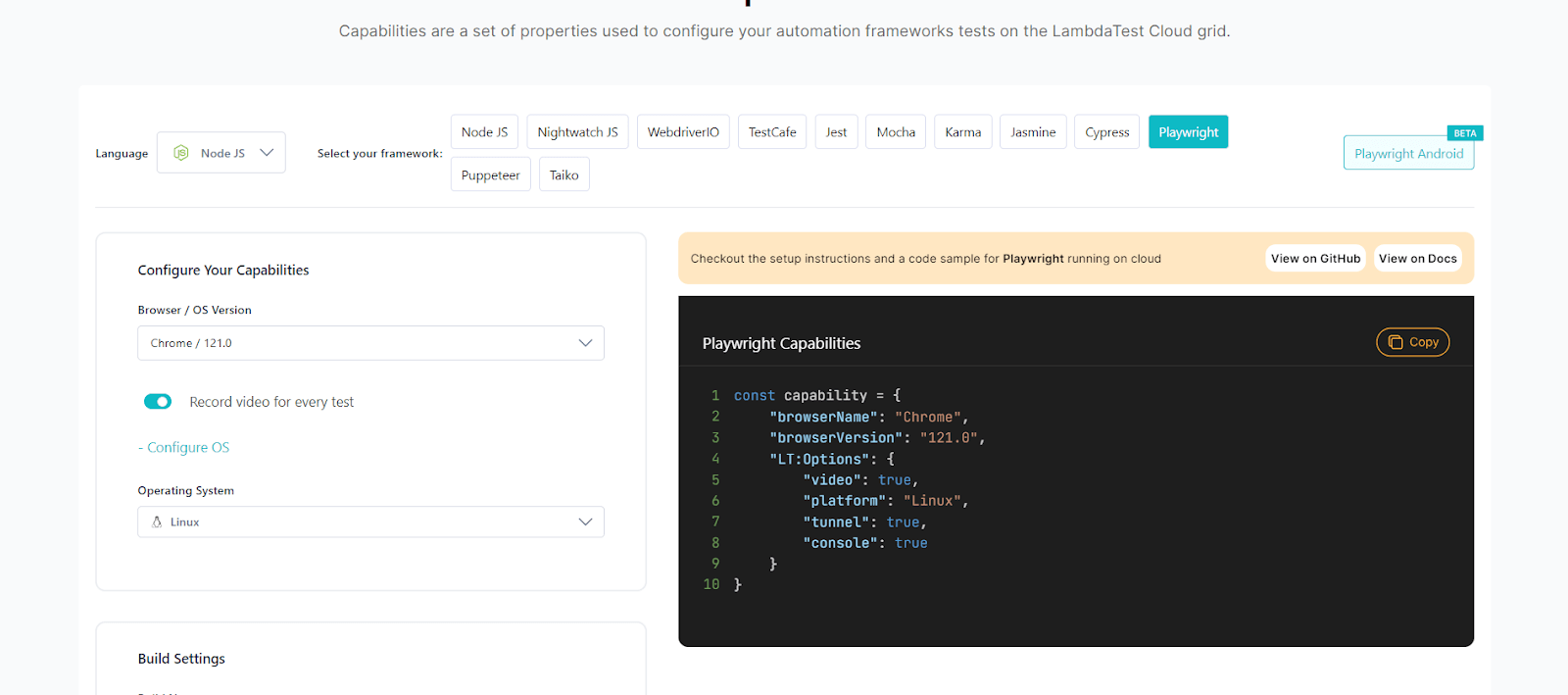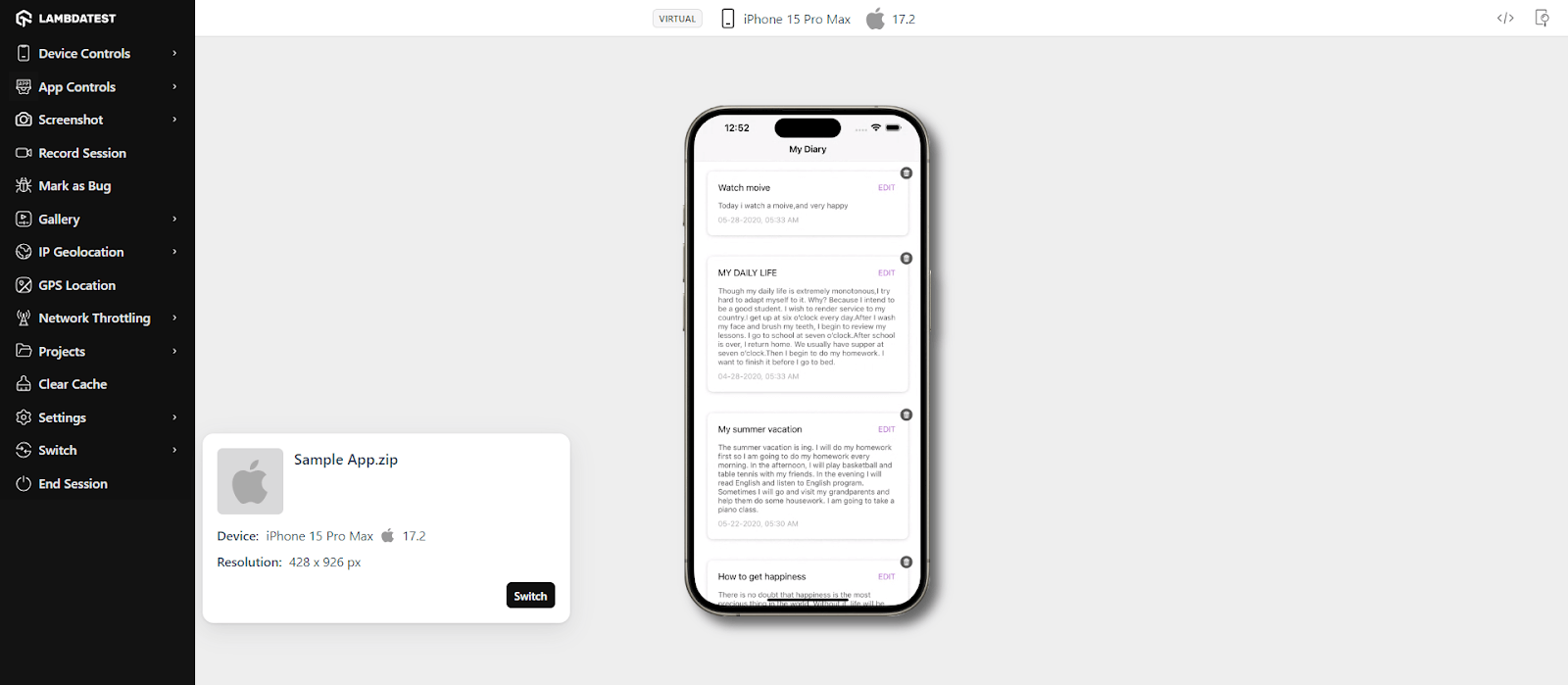December’23 Updates: Playwright Testing on Linux, Latest Features in Smart UI, HyperExecute, and More!
Salman Khan
Posted On: January 11, 2024
![]() 45123 Views
45123 Views
![]() 7 Min Read
7 Min Read
Hello developers and testers, Happy New Year! We are back to bring you the latest updates to the LambdaTest products introduced last month.
In December, we rolled out several features across different product lines. This includes generating Google Lighthouse reports while performing Playwright browser testing, running Playwright test suites on the Linux platform, using the network throttling feature for Appium automation, and more.
HyperExecute has been enhanced with new features, including cloning Git repositories using LambdaTest Tunnel and receiving job reports and artifacts via email. In Smart UI testing, we have released a new API for fetching the build state. Also, you can now capture screenshots of specific elements with Selenium.
Let’s have a look at these features in more detail.

TABLE OF CONTENTS
- Get Google Lighthouse Reports in Playwright
- Run Playwright Tests on the Linux
- Test Your Apps on Different Network Conditions
- Clone Git Repository With Tunnel in HyperExecute
- Get HyperExecute Job Reports Via Email
- Capture Screenshots of Specific Elements in Smart UI
- Test Your Mobile Apps on Simulators With iOS 17.2
- New Integrations
- Summing Up
Get Google Lighthouse Reports in Playwright
With Google Lighthouse reports, you can fix website issues like performance, speed, and page load times. Accessibility issues are also covered, which ensures the web app works for everyone. To help you keep track of your website performance metrics, we have added support for generating Google Lighthouse reports for the Playwright framework.
You can leverage Google Lighthouse reports while performing Playwright testing to track the performance and quality of your web applications. These reports comprehensively analyze factors such as page speed, accessibility, SEO, and more. You can quickly identify and address performance bottlenecks, accessibility issues, and other critical aspects that affect user experience.
This report not only increases the efficiency of your Playwright testing process but also ensures that web applications meet the highest standards in terms of performance and user accessibility, ultimately resulting in more reliable and user-friendly web experiences.
Run Playwright Tests on the Linux
Along with support for Lighthouse reports, we have enabled support to run Playwright tests on a Linux operating system.
To generate Playwright capabilities for Linux, head over to the Automation Capabilities Generator.

With support for web testing on Linux, you can perform Playwright automation testing on more than 50 browsers. Also, you can run parallel tests to speed up your testing process, offer quick feedback to developers, and contribute to faster release cycles.
 Note
NoteRun your Playwright tests on Linux across 3000+ browser versions. Try LambdaTest Today!
Test Your Apps on Different Network Conditions
Testing your mobile applications in different network conditions is important to avoid sub-optimal functionality, slow loading, and increased latency. Also, poor connectivity can result in unreliable service delivery and user frustration if you fail to simulate real-world scenarios.
To help you with network simulation for mobile automation testing, we have released the network throttling to test your web and native apps using Appium on low latency network conditions, such as 2G, 3G, and LTE, or even offline. And, this test you can perform with varying upload and download speeds. It allows simulating different network profiles, replicating real-world scenarios, and ensuring reliable testing for web and native applications on a real device cloud.
You can start a test session using predefined network profiles with the networkProfile capability.
Check our guide to get started with network throttling for app automation.
Clone Git Repository With Tunnel in HyperExecute
HyperExecute now allows you to clone a Git repository using the LambdaTest Tunnel. This feature ensures secure data transfer between storage and your local machine, providing an additional layer of security that is particularly useful for private storage located on a private network or behind a firewall.
With this new feature, you can effortlessly connect to private networks and clone storage as if on the network. Whether your repositories are public or private, you can easily clone them all from your Git provider using LambdaTest Tunnel.
To get started, follow our guide to cloning a repository via LambdaTest Tunnel.
Get HyperExecute Job Reports Via Email
Manually downloading job reports and artifacts from HyperExecute can be time-consuming and repetitive.
However, our latest feature eliminates this challenge by allowing you to receive them directly to your designated email address. This saves you valuable time and eliminates manual efforts.
With this feature, you can get instant access to important job details through automated email delivery. So, it’s time to say goodbye to scrolling through the download UI – now the information you need comes straight to you.
For more details, read our guide HyperExecute job reports and artifacts via email.
Capture Screenshots of Specific Elements in Smart UI
This newly introduced feature in Smart UI testing lets you capture screenshots of specific elements in your web application using Selenium.
Selenium provides a variety of search mechanisms, including XPath, CSS Selectors, and more, that allow you to identify and capture screenshots of targeted web elements while performing visual regression testing.
For example, if you want to capture a screenshot of a specific element, all you need to do is just pass a webhook to your test cases where the screenshot needs to be captured.
Refer to our documentation – capturing the screenshot of a specific element.
Bonus addition: A new API is added that lets you easily fetch all your Smart UI build statuses by making an API call to fetch the status. Check our guide to get started – APIs for Smart UI Automation.
Test Your Mobile Apps on Simulators With iOS 17.2
To ensure your mobile applications are compatible and function seamlessly with the latest iOS version, test them now on the latest iOS 17.2 simulators on our virtual testing cloud. This helps you identify and address any potential bugs or performance issues specific to the latest iOS 17.2.
LambdaTest virtual testing platform supports web and native app testing on the iOS simulators running iOS 17.2.

New Integrations
We constantly update our integration bucket to ensure compatibility with your preferred tools. Here are the latest LambdaTest integrations:
- Gradle Plugin: LambdaTest integrates with Gradle for Espresso automation. Gradle is a build automation tool for multilingual software development. By managing the entire development life cycle, from compilation to testing and deployment, the LambdaTest Gradle Plugin enables efficient parallel testing on real devices.
- New Relic: It is an observability platform for monitoring and diagnosing software applications and seamlessly collects data from your software applications, infrastructure, and logs.
LambdaTest integration with New Relic allows you to access LambdaTest test results within a customized New Relic Dashboard that provides a comprehensive overview of system performance and potential issues. This integration allows you to accelerate product delivery without compromising quality and speed.
Enhance your testing strategy with our detailed guide on Playwright Headless Testing. Explore further insights into Playwright’s capabilities in this guide.
Summing Up
In 2024, we are working on more powerful features to keep your workflow supercharged. You can keep an eye out for upcoming updates and improvements planned by checking the LambdaTest Changelog.
We also invite you to become an active part of our community at LambdaTest. Visit the Feature Requests category in the LambdaTest Community to share your insights, request feature enhancements, or suggest improvements to our product. Your input is invaluable in shaping the future of LambdaTest.
While you wait for these exciting updates, dive into the LambdaTest Future of Quality Assurance Report, which offers valuable insights into the current quality assurance landscape and its future.
Got Questions? Drop them on LambdaTest Community. Visit now
















